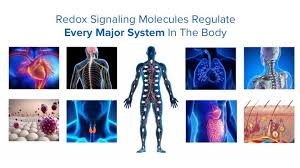

Redox signaling, a process fundamental to cellular function, involves the transmission of messages within and between cells to regulate various physiological processes. In the context of oral health, redox signaling has been found to offer several benefits that contribute to overall oral well-being.
One significant advantage of redox signaling in oral health is its ability to reduce inflammation. Inflammation is a natural immune response to infection or injury, but when it becomes chronic, it can lead to various oral health issues such as gum disease and periodontitis. Redox signaling molecules help modulate the inflammatory response, keeping it in check and preventing excessive tissue damage in the mouth.
Furthermore, redox signaling supports the oral immune system, which plays a crucial role in defending the body against harmful pathogens present in the mouth. By maintaining a balanced redox environment, the immune system is better equipped to identify and combat potential threats, thus reducing the risk of infections and oral diseases.
Another benefit of redox signaling in oral health is its role in balancing the oral microbiome. The oral cavity is home to a diverse community of microorganisms, some of which are beneficial, while others can be harmful if their population grows unchecked. Redox signaling helps regulate the microbial environment in the mouth, promoting the growth of beneficial bacteria and keeping pathogenic species in check. This balance is essential for maintaining oral health and preventing conditions such as tooth decay and bad breath.
In addition to its role in immune function and microbial balance, redox signaling also plays a part in tissue repair and regeneration in the oral cavity. The mouth is a dynamic environment subject to constant wear and tear, and the ability to repair damaged tissues is crucial for overall oral health. Redox signaling molecules facilitate the repair process by signaling to cells to multiply, differentiate, and migrate to sites of injury, ensuring efficient healing of oral tissues.
While redox signaling offers significant benefits for oral health, maintaining a healthy mouth requires a comprehensive approach that includes good oral hygiene practices, a balanced diet, and regular dental check-ups.
Proper oral hygiene, including brushing teeth twice a day, flossing, and using mouthwash, is essential for removing plaque and preventing oral diseases. Brushing helps eliminate food particles and bacteria that can lead to dental caries and gum disease, while flossing cleans between teeth and along the gumline, where a toothbrush cannot reach. Incorporating mouthwash into a daily oral care routine can further enhance oral hygiene by reducing bacteria and freshening breath.
Diet also plays a crucial role in oral health, as the foods we eat can impact the microbial balance in the mouth and the overall health of oral tissues. A diet high in sugary and acidic foods can contribute to the development of cavities and erosion of tooth enamel, while a diet ong teeth and gums. Drinking plenty of water is also beneficial for oral health, as it helps flush out bacteria and food particles, while maintaining saliva production for natural cleansing and remineralization of teeth.
Regular dental check-ups are vital for detecting and preventing oral health issues before they become serious. Dentists can identify early signs of decay, gum disease, and other problems during routine exams and cleanings, allowing for timely intervention and treatment. Additionally, professional cleanings help remove stubborn plaque and tartar buildup that cannot be eliminated through regular brushing and flossing, reducing the risk of oral diseases and maintaining overall oral health.
In conclusion, redox signaling plays a crucial role in promoting oral health by reducing inflammation, supporting the immune system, balancing the oral microbiome, and facilitating tissue repair and regeneration. However, maintaining a healthy mouth requires a holistic approach that includes good oral hygiene practices, a balanced diet, and regular dental check-ups. By incorporating these strategies into a daily routine, individuals can enjoy the benefits of redox signaling and achieve optimal oral health.
James Eckburg
